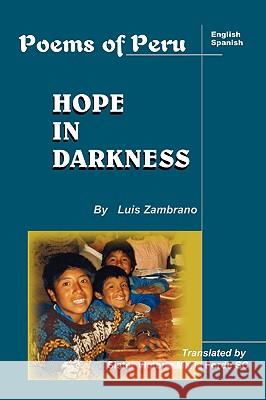Hope in Darkness: Poems of Peru » książka
Hope in Darkness: Poems of Peru
ISBN-13: 9781412091176 / Angielski / Miękka / 2006 / 328 str.
INTRODUCTION Twelve years ago I became the link that connected two of my friends, Luis Zambrano, a poet in the Peruvian Andes, with Sister Victoria Marie Forde, a poet in Cincinnati, Ohio. The result is this beautiful book, Sister Victoria Marie's translation into English of four small books of poetry written in Spanish by Luis Zambrano in the years 1974 to 1990.
My part has been to support the work since its beginning. Uniting the two poets was not an easy task, given the geographic distance. Helping to edit the translation, and explaining specific Quechua phrases and customs were enjoyable tasks that I could do because I had lived and served for more than 25 years in Peru, 20 of them in Puno. It was there in the Diocese of Puno in 1982 that I became acquainted with Luis Zambrano. With him I participated in the pastoral life of the diocese, especially when, in all of Peru, political violence attacked the life of the poor and they expected a clear, Gospel voice from the Church. Although Zambrano writes of experiences of life and love, much of his poetry treats of the social reality, the human problems and the struggles of his people. Because of this, the writer Jose Vasquez in the prologue to Blood, Cries...the People considers Zambrano the principal representative of the social-realistic poetry of Ica, Peru where he was born. Many of the poems have a political theme and express the author's deep concern about the happenings in the world, in Latin America and in his own country. If you are from the United States, you may not like some of the poems in this book. However, as Americans we must make an effort to understand the thinking of others, even when that thinking is critical ofus and of our leaders. This poetry gives us the opportunity to open ourselves to some Latin American thinking.
Zambrano's poetry encompasses an immense and intense gamut of experiences and emotions: awe and joy in nature, heartfelt compassion and solidarity with the poor, hungry and outcast; clear and defiant condemnation of injustices combined with pity for those who commit them, deep sorrow, a bit of humor or whimsy and much more; but that which marks it especially is great Latin American hope. It is this hope that makes the poetry not only interesting but also surprising and vital. Those who read this book will come to know the feelings and the thinking of a man, a Peruvian, a priest, who lives life intensely, who loves his people and who lets himself be loved by them.
-Sister Mary Barbara Philippart, Sister of Charity of Cincinnati.











